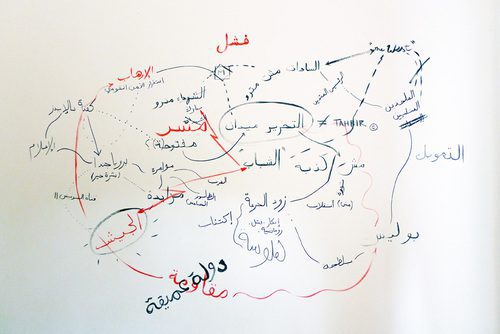Beirut, Cairo, Egypt
23 Nov 2014 - 10 Jan 2015

Courtesy of the artist and Beirut.
Adelita Husni-Bey takes us to three different urban settings through the language of legislation with White paper, a chaptered research and exhibition project travelling from Egypt via the Netherlands to Spain.
The evolving series of newly commissioned artworks and discursive frameworks, collaboratively shaped and shared by Beirut in Cairo and Casco in Utrecht, explore the conditions and tensions emerging when urban redevelopment schemes come into conflict with existing communities over housing rights, questions of ownership, and notions of the commons. This first chapter also features a corollary body of works commissioned by Beirut and realized in Cairo over the course of the last year.
The centrepiece of White Paper: The Land (2014) is a video-installation reflecting on ‘Cairo 2050’, a government-backed and privately funded metropolitan development plan of epic proportions, which threatens the livelihood of many informal settlements such as the neighborhoods of Gezirat al-Qursaya and Ramlet Boulaq. The video was realized in collaboration with film-maker Salma El Tarzi and activist Nazly Hussein and features a workshop with members of both areas, who engage in debates that challenge the virtue of language as prime ground to assess the threats neoliberal urban planning policies pose to social and legal justice in Egypt.
The role of language in shaping and producing narratives of contemporary reality through journalism or other forms of cultural production is the main thread of the second piece on view: (On) Difficult Terms (2013). The installation is based on a meeting Husni-Bey held in October 2013 with journalists of Mada Masr, a platform for independent and progressive journalism in Egypt. (On) Difficult Terms, tISP (2014) revisits its layered meaning in Arabic a year later with participants of Beirut’s the Imaginary School Program.
Acting as a footnote, or a hint to a moment in time, is Time Under Siege (2013), a small collection of video segments the artist gathered through an open call to recognize the expedients, detours, coping-mechanisms, moments of boredom and communion Cairo inhabitants have found to deal with State-imposed curfew.
White Paper is co-curated by Beirut, Cairo and Casco, Utrecht.